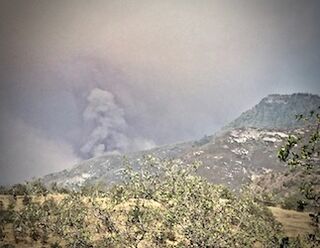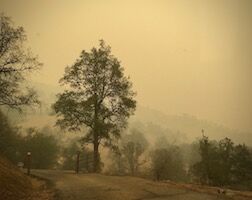Environment
What Can Wildfire Smoke Teach Us?
One pathway of global warming is extreme heat to drought to flames to smoke.
Posted September 27, 2021 Reviewed by Lybi Ma

There are times when circumstances necessarily avert my attention from what I would rather be doing, such as writing. Recently my attention has been focused on a wildfire near my house in the foothills of the Sierra Nevada Mountains in California.
Today, I will write and let everything else wait. It is a good activity because I should not go outside today.
What I see outside my picture window at this moment is a wall of smoke. The Air Quality Index (AQI) is 453, categorized as “hazardous” to one’s health. A “good” AQI is 0-50. The numbers change through the course of a day, but today is definitely not good.
The falling ash within the smoke could be imagined as very small snowflakes, but in reality, they are mostly the remains of trees, brush, and wildlife in the Sequoia National Park. They land here as if a burial ground, a last farewell spread across my home. I grieve the loss of what they were in life.

On September 9, there was a lightning storm like none I’ve ever witnessed. Electrical discharges came frequently from all directions. The sounds were startling. I yelled back to the sky, “Please, don’t start fires!”
That wish was not fulfilled. The plumes of smoke became visible from my house by September 11. A meeting of our small village was held on September 12 and I received a text alert during the night that I was in a “voluntary evacuation” area. On September 13, I chose to drive with my dog to stay with very loving, generous family members. I will be forever grateful for their support and the tissues I wept into.
Watching the fire news daily, I decided to return home after ten days to assess my local situation. By then, two nearby large fires had merged and been named the “KNP Complex,” which currently covers over 42,000 acres. It is still expanding as I write; containment is projected by mid-October.
The smoke I see today is not from the major fire but from back-burning fires done to protect my community and those nearby. The firefighting personnel at this point are over 1700 people; fire trucks and other vehicles are abundant through the village and accessible areas. There are crews for helicopters, planes, and bulldozers at work.
Everything seems surreal.
While the smoke imprisons me inside my home, I will use my air-purifiers, clean the smoke that clings to surfaces with a wet rag, check in with others who are staying, read, and write.
The September 2021 issue of Stanford Magazine article, “The Heat is On” by Katherine Ellison, addresses a hopeful objective as stated in the subtitle: “Stanford faculty are blazing paths in fire control and prevention to help us live in a changed climate.”
Here is my short paraphrased summary of highlights that caught my attention. There are many more.
- An interdisciplinary group has been formed to explore wildfire problems from different perspectives.
- The number of extreme wildfire weather days in California has more than doubled since the 1980s. Having a longer wildfire season makes shared resources difficult to manage.
- Smoke affects millions of more people than fires. It impacts health, related to respiratory and heart problems.
- New technology uses remote sensing of patterns of moisture and dryness on the ground to identify where fires might start.
- Hydrogels have been invented that can be used as a carrier for fire retardants to be sprayed in the summer to stick in place and repel fires.
It is comforting to know that many individuals are addressing practical solutions to wildfires with approaches related to management, health, and new technology.
Yet in this moment, my immediate concern is my inner life.
This fire adds yet another personal stress to my heap of difficult events that includes the Covid pandemic, political turmoil, personal health issues, and financial uncertainty.
I ask myself, “How can I be both active and at ease through these times?” There is no single answer for all those in similar or worse situations. The reality of continuous change can be a challenge that expresses itself in many forms.
What I want to change within me is my individual response to unexpected events. I don’t easily “take things in stride.” I often weep for those suffering through situations that are horrifying beyond my comprehension. My tears speak to our connections across differences that shrink in the midst of a crisis.
The concept of focusing on what I can control, and letting go of what I cannot but another can, has helped my decision-making on many issues. Diversity of skills and attributes is truly a gift to our common good when we work together. While someone else may develop new ways to prevent fires, I can address our need for shared values for our mutual well-being.
By integrating my rational skills and emotional states, I have taken advantage of what each offers to guide me through complex situations.
As the fire burns away outside my village, something is metaphorically burning away inside me. My self-concept seems to be transforming. I am able to “let go” more easily of what is now changing. Perhaps clarity will dissipate my inner smoke.
When I “let go” or release thoughts that are judgmental or worrisome distractions, there is a sense of relief, as if a physical burden has been lifted from my shoulders. It is like removing junk from the front of a closet to reveal deeply hidden treasures behind. I sense those treasures are profoundly connected to my heart. They include principles of courage, beauty, and truth to help me overcome difficult changes. Just as treasures hidden in the back of the closet, they have been waiting for me to find them.
My heart goes out to those experiencing the difficulties of extreme climate change. My gratitude goes out to those who are serving the needs of the many suffering from natural or imposed disasters. I long for all to awaken to our shared connections as one human species during these challenging times.
Thank You, Firefighters
© Betty Luceigh, September 2021
References




